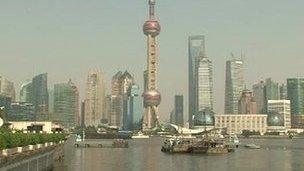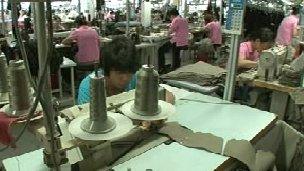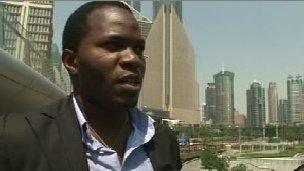Africans eye Chinese enterprise
- Published
Egon Cossou reports
Standing in the early summer heat of Shanghai, regarding the skyline of steel and glass, it is easy to think you are getting a bird's-eye view of the future.
This truly is a megacity - with a population of more than 23 million.
It is the financial heart of the world's newest economic superpower.
Shanghai's breathtaking expansion mirrors the startling growth of the national economy.
That growth is slowing down - but to a rate most countries in the West can only dream of - and is currently standing at about 8%.
Fuel for growth
China's economic might is fuelled by raw materials and new markets.
Africa is rich in both.

Shanghai's economic might mirrors the enormous power of the national economy
Trade between the two sides is now thought to be worth around $160bn a year.
But it is not just a one way street.
An increasing number of African entrepreneurs are now seeing China as a land of opportunity.
In the town of Jintan, which is connected to Beijing by a super-fast modern eight lane highway, one Zambian has taken that lesson very much to heart.
Enock Mundia is co-owner of Shanghai Liberty Apparel, which turns out a million items of clothing a month for big international brands such as Uniqlo and Eddie Bauer. It even exports clothing back to Zambia.
It is a big place, employing some 3,500 people.
Mr Mundia is an amiable, upbeat man, proud of what he has achieved in the five years since he acquired his interest in the firm.
He says its much easier doing business here than in Zambia.
"The infrastructure is so good here," he says over the racket of the endless ranks of sewing machines clattering away.

Chinese manufacturers pose a serious threat to rivals in Africa
"From point A to point B, to transport your goods is so fast."
But despite the sheer convenience of building his business here, Mr Mundia is still a firm believer in the economy back home and maintains that trade between China and Africa is essential.
He seems a little exasperated at the criticisms aimed at China's involvement in Africa.
"The African people right now, they need investors who can come and invest quickly and improve the livelihood of the African people," he says.
"So if China is doing this, why not?"
But across the globe in Cape Town you can see what critics say is the flip side of the China-Africa trade.

Student Arnold Ngowani says it is vital to understand Chinese culture
The Cape region used to be the heart of a thriving South African textiles industry.
It is a very different story now.
Manufacturers say they are being strangled by imports from China.
Michael Bargraim, the president of the Cape Chamber of Commerce, says his family business and hundreds of others in this area, just could not compete.
Call for protectionism
His own family's business has been forced to close down its clothing factory after more than 100 years.
And Mr Bargraim estimates that the industry in the western Cape province of South Africa is now about a tenth of what it was in its heyday.
The situation is so serious that South African textile companies have concluded a deal with trade unions to slash the wages offered to new employees by 30%.
Tony Ehreinrich, from the Congress of South African Trade Unions, is demanding action.
"In the industrial area of the clothing industry in the Western Cape alone, we've lost over 120,000 jobs in the last five years," he says.
"There's no way we can compete with China in South Africa, where we uphold labour standards and labour rights.
"We should keep them out of our markets."
'Learn the culture'
In spite of such concerns, it is widely believed that China is now Africa's biggest trading partner.
And that is attracting more than just businessmen to China.
Zambian Arnold Ngowani is studying business at university amid Shanghai's dazzling skyscrapers.
Walking the streets here, he attracts the occasional curious glance. Despite all the trade, black faces are not that common.
"I came here not only to learn business, but how to do business with the Chinese - and more importantly, to learn the culture of the people," he says.
"You need to understand the people you are doing business with.
"I think this can reduce some of the conflicts we have had. Some of the conflicts are as a result of not understanding the culture of the other person."
Mr Ngowani intends to go home and start a business in Zambia - utilising the contacts he has formed here in China.
Land of opportunity
Speaking at his factory in Shanghai, Mr Mundia believes the future for Africa lies in seeing China as more than just a source of investment.
"As Africans, we'll need to look at what China is lacking," he says.
"For instance, Chinese people need food. Zambia is one of the biggest growers of rice. So why not export rice to China?
"We'll need to invest long where China is short."